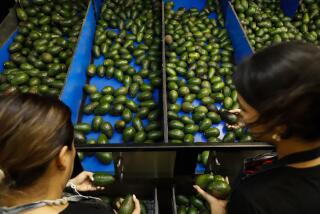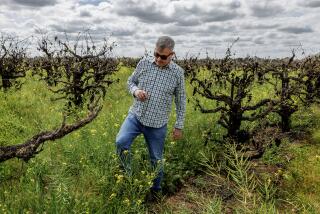Counterfeit Apples Are a Bitter Fruit for U.S. Growers
- Share via
China, long known for its freewheeling piracy of computer software, videos and music CDs, now stands accused of counterfeiting apples.
Apple industry officials from California and Washington say that their representatives in Taiwan have intercepted thousands of boxes of apples falsely labeled as having been grown in the two states.
Instead, the officials contend, they were an inferior type of Fuji apple grown in China. The cartons, stickers and documentation were bogus, officials said, and the apples appeared to have been smuggled into Taiwan from mainland China. Taiwan prohibits the importation of Chinese apples.
The Washington Apple Commission filed criminal complaints last month in Taiwan to stop Taiwanese wholesalers from illegally importing Chinese apples. It has also enlisted the aid of Taiwanese customs and product quarantine officials in an effort to protect its trademark in that country, the top export market for California apples and No. 2 for Washington.
If the industry doesn’t halt the practice now, said Steve Lutz, president of the Washington Apple Commission in Wenatchee, “next September we’ll be looking at a tidal wave of apples from mainland China labeled California and Washington.”
The problem came to light in December when industry representatives returned from Asia to report seeing phony Washington apple logos and falsely labeled boxes. The apples had not been washed or waxed, sure signs that they were not from the United States.
The boxes, some of them marked “Washington,” were about half the size of Washington’s standard 42-pound box.
Some apples bore stickers describing them as Red Delicious, despite the fact that they were Fujis. Other boxes, supposedly from California, were printed with “The Best Apple. Fuji” and an address in Petaluma, and still others carried the name of Sierra Hills, a big Stockton grower.
In mid-January, Washington apple growers and industry officials were touring Taiwan when that country’s customs officials received a tip that two containers of counterfeit apples were on their way to Taichung, Taiwan, destined for a cold storage company, Wan Tai Refrigerating Co.
When customs officials showed up at Wan Tai, they found thousands of boxes of suspect apples, according to Bruce O’Connor, a Seattle attorney for the Washington Apple Commission.
The fruit had been shipped from Singapore, O’Connor said, just in time for the Chinese New Year celebration--the peak sales time for apples.
Other tips led officials to counterfeit apples at wholesale markets in Taipei and Taichung.
In fact, industry officials say, the threat of bogus apples from China has probably passed for this season, because the Chinese do not have the refrigeration and storage needed to keep fruit from rotting.
But the U.S. growers fear that if Taiwan does not crack down on its local wholesalers and carefully check shipments at the ports, the problem could resurface in magnified form next fall.
Whether Taiwanese officials will take the problem seriously enough is a subject of debate.
“It’s sometimes difficult for us in the U.S. to understand how business is done in other countries,” said Don R. Heinicke, an apple grower who is chairman of the Washington Apple Commission. “It’s tough to operate by our rules in other countries.”
Taiwanese and Chinese authorities in Washington said they did not know enough details to comment on the matter.
Daniel Martinez, director of the agricultural trade office at the American Institute in Taiwan, the de facto U.S. embassy in Taipei, said Taiwanese authorities “have cooperated . . . apparently things are moving in the right direction.”
The stakes are high.
So far, estimates are that California and Washington have lost a total of $500,000 in apple sales in Taiwan, according to Kenton Kidd, president of the California Apple Commission in Fresno.
“That’s a big deal,” Kidd said. “It jeopardizes our business considerably.”
Taiwan is California’s biggest export market for apples, with 1995 sales valued at $38 million. About 30% of the state’s crop (and 67% of Fuji apples grown in the Golden State) is shipped to Taiwan annually.
For Washington, the nation’s top apple producer, Taiwan is the second-largest and most profitable export market. Washington typically sells 4 million boxes of apples to Taiwan, with the best Fujis selling for $30 to $50 per 100-apple box. By contrast, the fruit from China was selling for $12 to $15 a box.
For apple growers, it couldn’t have hit in a worse year. Although the crop nationally is well down from last year, curtailed demand in some of the biggest export markets has led to a glut--and lower prices.
U.S. apples have been effectively priced out of the lucrative market in Mexico because of a 101% tariff imposed by that nation in September. And the financial crisis in Asia has pared sales of Washington apples by 40% or so to that part of the world.
Taiwan, by contrast, has remained a bright spot. The economy there has remained stable even as currency devaluations have forced other Asian nations to limit imports. Moreover, the Taiwanese buy the highest-quality apples--Fujis--and pay top dollar.
“We have a lot riding on the market,” said Jim Thomas, a spokesman for the Washington Apple Commission. “It doesn’t take a lot of bad apples to ruin a good market for us.”
In 1996, a report to Congress from the U.S. Trade Representative’s office cited China as the worst violator of U.S.-copyrighted intellectual property for pirating technology, such as software, which often emerges bug-ridden.
Apples, in some respects, pose the same problem. The Washington Apple Commission said the inferior quality of Chinese-grown apples could wipe out a hard-won market that U.S. apple growers have worked two decades to build.
Kidd of the California Apple Commission said: “It’s a good way to ruin an industry in a hurry.”
More to Read
Sign up for Essential California
The most important California stories and recommendations in your inbox every morning.
You may occasionally receive promotional content from the Los Angeles Times.













